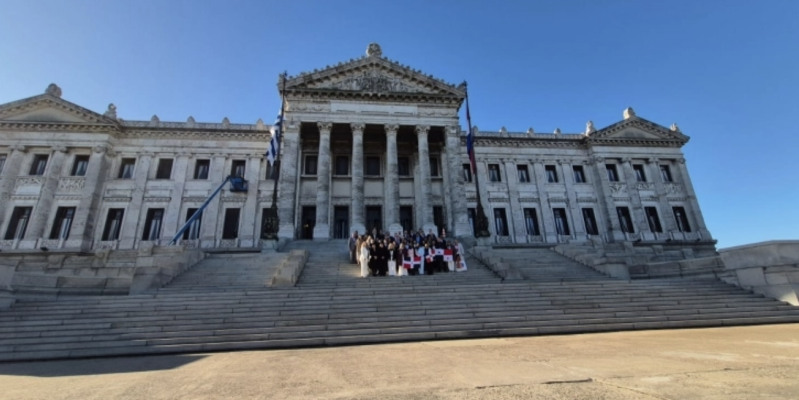
Lawmakers from 16 Latin American and Iberian countries convened in Montevideo this week for the Ibero-American Congress for Life and Family, issuing a unified call for legislation that protects the unborn and strengthens the family as the bedrock of society. Held at Uruguay’s Legislative Palace, the event marked a growing effort among conservative legislators to push back against progressive agendas they say threaten traditional values across the region.
Continental unity for core values
The meeting is chaired by Dr. Arón Lala, president of the Ibero-American Congress for Life and Family, and brings together parliamentarians from Honduras, Mexico, Guatemala, Panama, the Dominican Republic, and Peru.
On the first day of the event, delegates shared legislative strategies and challenges related to upholding life, marriage, and parental rights in their respective nations.
Uruguayan legislators Inés Monsillo and Fernanda Huesper welcomed participants and praised the regional cooperation. “We face the shared challenge of defending families, because we are in the midst of a cultural battle against gender ideology,” Monsillo said at the opening ceremony.
Testimonies from the legislative front
Honduran Deputy Nelson Márquez, head of the National Party caucus and president of the National Policy Commission, emphasized the spiritual foundation of lawmaking. “There can be no state with true justice, true freedom, or true democracy if it excludes God from its principles,” he said.
Mexican Senator Tabitha Ortiz reflected on her experience as a young lawmaker, noting the rapid spread of legalized abortion in Mexico—from two states six years ago to 22 out of 32 today. “Let us be brave. Let us defend life. Let us defend the family,” declared the 33-year-old legislator.
Concrete proposals to strengthen families
Guatemalan Deputy César Augusto Amés Quintarruano, vice president of his nation’s congress and a philosophy scholar, highlighted recent legislative success. “Last year, we passed a law for the social protection of the family. We did not base it on religion, but on the Constitution of the Republic,” he said.
Panamanian Deputy Lilia Bautista outlined reforms in Panama recognizing every human being from conception as a child and granting the unborn legal standing in court. “This places Panama among the few countries with this level of legal protection for life,” she said.
Current challenges and a call to action
Dominican Deputy Mirna López questioned the philosophical underpinnings of modern inclusion efforts. “Inclusion for what purpose? Who are we including? What principles guide this inclusion?” she asked. “True inclusion is rooted in respecting the person as free, capable, unique, and full of potential.”
Peruvian Congresswoman Milagro Aguayo, who has introduced nearly 100 successful legislative proposals, warned of ideological threats. “The agenda advancing through our laws opposes the very nature of humanity. The family is under threat of extinction, and if it collapses, there will be no safe space left for human development.”
Four pillars for family strengthening
The congress proposed four key initiatives for implementation across the region:
- Family institute: establish dedicated bodies to promote and recover the concept of family as distinct from alternative forms of cohabitation.
- Council of parent associations: empower parent organizations to move beyond school-based activities and address wider societal challenges.
- Family observatory: develop tools to measure the impact of family-centered policies and manage resources more effectively.
- Family perspective: integrate a family-centered lens across all public policies and legislative agendas, in place of the gender perspective.
Message of hope and commitment
Panamanian Deputy Yuseida Marín, who chairs the Commission on Women, Children, Youth and Family, concluded with a message of encouragement. “Today more than ever we must care for and strengthen our families, because where there are families with values, there is hope. Where there is hope, there is a future. Where there is a future, there is life.”
The congress, which formally launched the Ibero-American Congress for Life and Family, continues with focused working sessions. Legislators pledged to return to their countries with renewed commitment to advance coordinated efforts in defense of shared foundational values.
“A nation will be only as strong as its families are strong,” said Dr. Lala in closing, setting the tone for future collaboration across the Ibero-American region.






